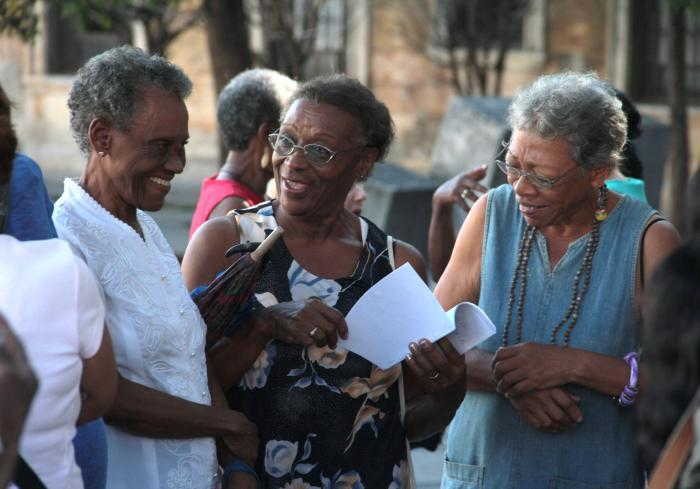
Ensuring that our people live not only longer, but also enjoy healthier lives is at the heart of work by institutions in a society like Cuba’s, with 20.4% of its population at 60 years of age or older.
In an effort to contribute to better quality of life for older adults, the Ministry of Public Health is working on training specialized personnel and incorporating elements of geriatrics into other medical specialties, to better serve an aging population in a comprehensive manner.
In this regard, it is worth mentioning the construction of several facilities, including the first unit for the evaluation of physical performance of older adults in Cuba – and one of the few existing in Latin America and the Caribbean -opened on October 1, 2019, taking into consideration the concept of healthy aging, promoted by the World Health Organization.
“This unit makes it possible to evaluate functional capacity based on variables such as walking speed and muscle strength, among other essential aspects. It also supports the diagnosis and rehabilitation of elderly persons with reduced functional capacity and promotes the development of research in key areas of aging and the training of competent human resources,” explained Dr. Lilian Rodriguez Rivera, director of the Center for Research on Longevity, Aging and Health.
In previous statements, Dr. Iván Tápanes López, specialist in Geriatrics and Gerontology, and head of the Center’s physical performance unit, reported that the facility has high-tech equipment which allows for better diagnoses and assistance, research and comprehensive assessment from the physical point of view, evaluating the performance of activities like walking and others requiring physical effort and strength.
Similarly, on November 21, last year, the Alzheimer’s and Cognitive Disorders Center opened in the municipality of Habana Vieja, also the only one of its kind in Cuba, specializing in early diagnosis and treatment of Alzheimer’s, support for caregivers, family members and professionals involved in the care of older adults who suffer from this health problem, and research that contributes to improving the care and management of these patients, as well as working with institutions associated with the BioCubaFarma state entrrpise group, according to Dr. Rodriguez.
On the day of its inauguration, Dr. Niurka Casado Barralesuna said that a priority of the institution will be the preparation courses, to contribute to supporting the establishment of memory clinics at the municipal level, for the identification of the most complex cases, she explained.
With services including nursing, geriatrics, social assessment, neuropsychology and group therapy, the center is committed to comprehensive treatment and has computerized systems.
For its part, the Center for Longevity, Aging and Health is developing a training program for the specialty of Gerontology and Geriatrics; a new study plan for Master’s degrees in Public Health and Aging; and clinical nutrition and sarcopenia consultation (a term that describes the degenerative loss of skeletal muscle mass and reduction of muscle strength that occurs with aging) have begun as outpatient services.
Likewise, at the Center for Research on Longevity, Aging and Health, 15 protocols for hospital care were updated and others approved for chronic obstructive pulmonary disease, malnutrition, and related to the use of anesthesia in elderly patients at high surgical risk, with the goal of implementing these nationwide.
In relation to academia and the importance of lifelong learning, the new study plan for MSc in Public Health and Aging is in the design phase, as well as a professional development course in Gerontology and Geriatrics.
The National Program for the Care of the Elderly, with its three subsystems: community, hospital and institutional, is also in the process of being updated.
The committee and working group for the development of the specialty on the island was created at the Longevity, Aging and Health Center i, and the program for the development of the specialty of geriatrics for the period 2020-2025 is currently in the working phase.
Good health must be an essential component of society’s response to the aging population, added Dr. Rodríguez Rivera, who recalled a thought expressed by Comandante en jefe Fidel Castro Ruz, who said, “The most humane thing a society can do is to care for the elderly.”
ADRESSING DEMOGRAPHIC TRENDS
In addition to these centers, in response to demographic trends, Cuba has continued to prioritize care for the elderly.
With advances made this past year, a total of 53 services in this specialty are now available in Geriatrics, with 1,063 beds destined for these patients, 53 more than at the close of 2018, according to the Minister of Public Health, José Ángel Portal Miranda, in a review of 2019.
During this period, the number of beds in the 155 nursing homes increased, for a total of 12,419, as well as two new community centers for the elderly, for a total of 295.
More than 973,000 older adults joined grandparents’ circles during the year and 29 mental health departments were created, bringing the total to 178 nationwide.
IN CONTEXT
-In 2019, 675 patients were admitted by the Center for Research on Longevity, Aging and Health, a greater number than 2018.
-The occupation rate was 78%.
-The average stay was 7.9 days, 1 day less than in 2018.
-Some 7,579 medical consultations were provided, slightly less than the number reported in 2018.
-Some 401 surgical procedures were performed, higher than reported over the last five years and 123 more than in 2018.
-The clean surgical wound rate was positive, with no infections reported.
-The average preoperative stay was 1.7 days, less than in 2018.
-The introduction of minimally invasive surgery is advancing successfully.
 Escambray ENGLISH EDITION
Escambray ENGLISH EDITION





Escambray reserves the right to publish comments.